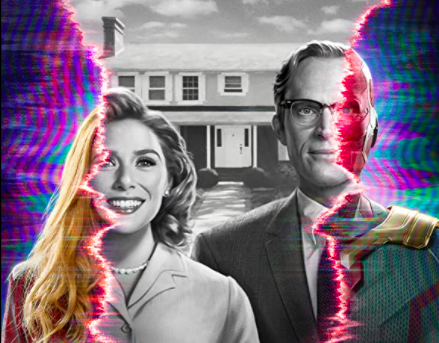WandaVision Review
March 19, 2021
The world of cinema and movie-going has been rapidly changing over the last few years. The emphasis has shifted to studios investing in streaming services to put their films and shows on, and Disney has completely embraced this idea. The Mandalorian turned out as a huge hit for the service in late 2019, and they soon promised much more from them. With there being new films and shows coming from Pixar, Star Wars, and Disney, Marvel dropped their first original show, WandaVision at the start of the year. WandaVision, like both The Mandalorian and the regular Marvel films, came as a huge hit, and is a real reason for people to extend their Disney+ memberships.
After a year without Marvel in 2020, WandaVision starts off the fourth phase of the Marvel Cinematic Universe, and picks up on a world still recovering from the events of Avengers: Endgame. The show follows Wanda Maximoff and her robotic husband, The Vision, as they live through an alternate reality with the structure of american sitcoms. Intrigue emerges when it’s revealed that the life that Wanda and Vision are living is being broadcast as a television program being monitored by a private military organization called S.W.O.R.D. The basic premise revolves around the agents of S.W.O.R.D. trying to uncover the mystery of this event, and Wanda and Vision living in this strange existence. From this point on, this review will contain spoilers.
The most striking thing about WandaVision is the presentation. The truth is that the superhero genre is becoming egregiously stale, and Avengers: Endgame served as a fitting finale to the Marvel saga. However, since Marvel wants to continue the stories of its characters, they will have to continue to tell stories in inspired and interesting ways, or else viewers will drop. WandaVision’s sitcom style of storytelling works so well in execution, that it makes the regular Marvel stories look boring in comparison. The idea of following these characters as they jump from one decade of television to another is the kind of creativity that Marvel needs more of. The blending of the two Avengers and this entirely different reality is pulled off seamlessly. The cinematography of each episode is consistent with the decade the show is in, the script takes on the appropriate level of conry dialogue. Each episode starts with a new theme song and is interrupted by a new commercial, all fitting together with the setting. And then, when the show breaks these rules to create uncomfortable scenes to keep the audience hooked on intrigue is what ties the show together.
The other standouts of WandaVision are the leading and supporting actors. Both Elizabeth Olsen and Paul Bettany expertly adapt themselves to fit into the style of program that they’re invoking. When the show decided to break that comfort, Olsen and Bettany also are shown off with the amount of emotions they equip in the show. These two work wonders as both the charismatic and quirky leads of a family television show, and as the former Avengers who are struggling to perceive their existence. As the show goes on, the viewer is given more and more of the characters and the leads perfectly carry it. Kathryn Hahn as the neighbor Agnes is a complete scene stealer as well. Marvel really benefits from letting comedic actors do what they want, and it’s clear that Hahn is one of the most successful characters of the show. The characters on the outside of Wanda’s magic sitcom bubble also provide levity in some parts that more or less drag.
The elements of WandaVision like the sitcom presentation, the actors, and the growing sense of intrigue is where the show really prevails, but the other add-ons to the story are far less interesting. In episode four, the show does a complete 180 to look at the story the viewer has been seeing at an outside angle. This whole part of the show feels just outdated if anything. Episode four has the exact same elements as the parts in the earlier MCU movies when Marvel was too scared to take risks. When Taika Waititi was making Thor: Ragnarok, he made the bold decision of completely throwing away all the aspects that made the other films a drag, such as the all the human characters and the boring science exposition. Thor: Ragnarok is widely seen as one of Marvel’s best films because it was able to take a character that barely anyone cared about and placed him into a story and setting that was actually fun and worthwhile. WandaVision seemed to start off in the same way, before shifting back to the safe, old Marvel formula. The season finale is one of weakest parts of the season, as it somehow decides to resolve itself with a stale CGI superhero fight. Kathryn Hahn peaks when she is revealed as the villain through her own killer theme song, but is then left to play the role as the generic evil antagonist.
By the end, WandaVision seemed like it had the potential to be one of the most interesting stories that Marvel could conceive, and for some of it, it was. However, the classic tropes of the MCU really dragged down the story from achieving real notoriety.



